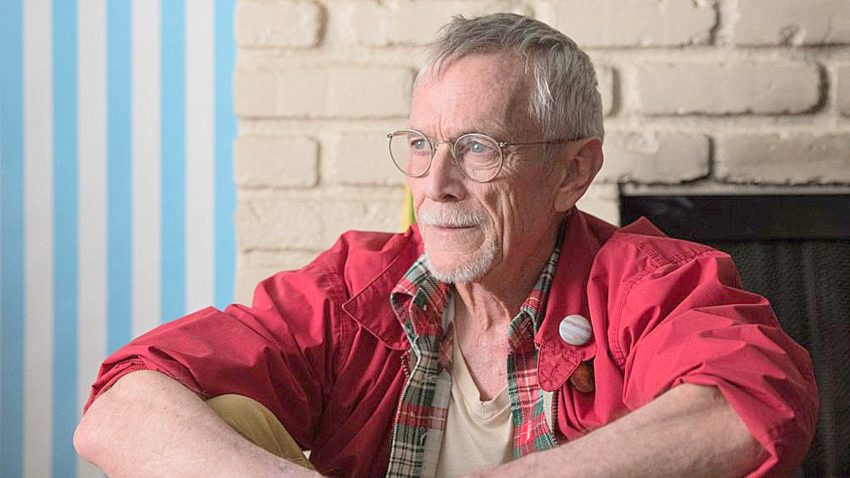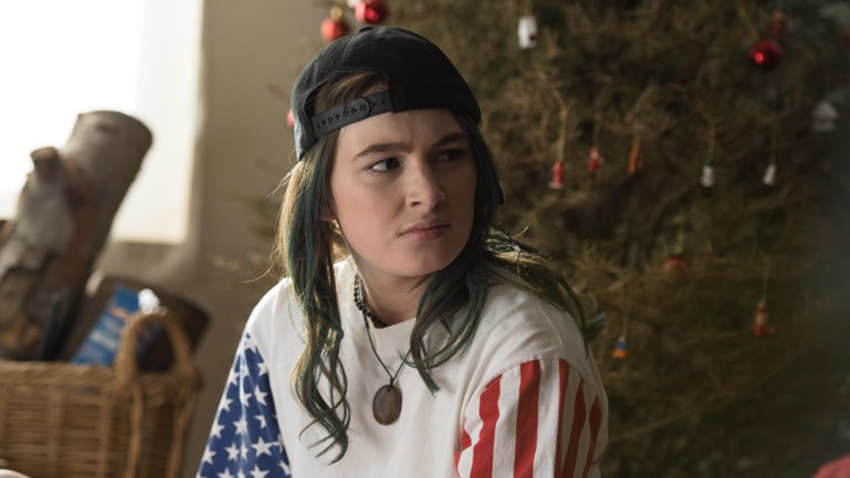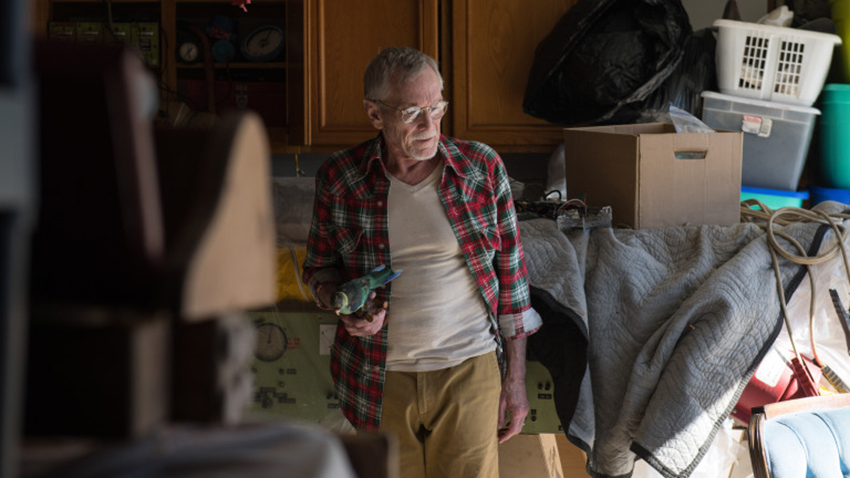
This story of Here & Beyond was inspired by my relationship with my grandfather, Lyle. He spent the last thirty years of his life taking care of my grandmother, Marge, who suffered from Parkinson’s disease. Soon after she passed, signs of his memory-loss became evident and eventually he was diagnosed with dementia. He actually passed away a few months ago and this story is meant to be a kind of subjective look at what it might have been like to be in his shoes in his later years. It was definitely a long journey to get it off the ground, but the benefit of hindsight is being able to forget about all the struggles and be like— “We did it!”
indieactivity: Did you start writing with a cast (You or any) in mind?
Colin West: I had known that Greg Lucey was going to play the lead role for a long time. In fact, we wrote it specifically for him to play and he has since said that this was the role that most closely aligns with his own personality. He was one of the first people I met after moving to Los Angeles years ago and I have since worked with him on multiple projects making our working relationship very fluid and comfortable.
Laurel Porter, who plays the teenage neighbor, knocked it out of the park in her audition and was a no-brainer. In hindsight think she actually reminded me of myself as a teen. And finally Christine Kellogg-Darrin was such a joy to work with. A natural. She was the perfect compliment for Greg and even had the entire crew shedding tears during her final scene.
indieactivity: How long did you take to complete the script?
Colin West: I co-wrote the film with my frequent writing collaborator, Corey Aumiller. You wouldn’t believe how many versions of this script there were… I’m almost embarrassed about it frankly. We spent a few months in the script phase trying to determine how far we wanted to push the time travel conceit. That was the main thing that took time. In the end, since we’d worked the script so much, there were many elements of the writing that sort of spoke to each other and overlapped. This really helped when we got to the edit and wound up cross-cutting the climax of the film. Those scenes ended up literally talking to each other.
indieactivity: During production, what scene (that made the cut) was the hardest to shoot?
Colin West: Honestly everything shot outside was kind of a nightmare. The wind was brutal the week we were shooting and we had to bring a few scenes inside that we had been planning to shoot out there. It lead to some last minute re-writes. Of course, in the end, those scenes ended up cutting in a wonderfully congruent way with the other scenes indoors and so we came to find that we should have shot it all indoors anyways! So it goes…
indieactivity: What works better in this latest production that might not have worked so well in the last one you did?
Colin West: Every project informs to the next one. I took much of what I’d learned making my other short films and infused that knowledge into the creation of this one. Contrary to other films I’d made, I approached this film with a more flexible directing style. I had the benefit of having multiple rehearsals with my actors before the shoot and it led to much more of a collaborative process when blocking and shooting that I had not experienced before.
Colin West’s Touching Drama Here & Beyond at Cinequest Film Festival
With this process I learned not to force the images in your head onto the screen but rather to allow the setting, costumes, characters, and collaborators to inspire me on-the-day. I learned to keep my eyes open. Like the mailman, that was totally out of chance and we were lucky to have captured that moment, which of course could not have been planned for—he was just delivering the mail and I was like “roll the camera!”. It ended up being one of my favourite moments in the film.
indieactivity: You produced and directed the film, what measure of input did it take to don these hats?
Colin West: My wonderful producers were Michael Orion Downing, Nick Benjamin, and Quinn Armstrong. I’ve previously done a lot of producing in the past so I have a producer’s brain, but all credit goes to them on this one. Admittedly it is hard to take off my producing hat sometimes, but being that I was also a co-writer I was able to produce on the page by planning, even in the script phase, for a powerful script that could still be shot for a small price tag and just a couple locations.
indieactivity: Is there anything about the independent filmmaking business you still struggle with?
Colin West: It’s all a struggle. If it’s not a struggle you’re probably not fighting hard enough for your films (or you’re a billionaire). But I must say the biggest challenge for me has been, and I can confidently say always will be, my own self. Whether it’s the drudges of self-doubt or the overzealous (and almost always unwarranted) moments of self-confidence, I seem to be really good at making it really hard on myself. But what motivates me to take the next step forward is the possibility of actually seeing something that I’ve put my everything into somehow adding something useful to the larger human conversation.

While the day-to-day can often be a miserable mush of insecurity, overthinking, and unbounded concern, I somehow never remember those moments. Maybe it’s an inborn defense mechanism, but those moments are always overshadowed by the very brief and often fleeting moments of pure truth buried in the act of actually trying to do something. Like an unpremeditated moment captured in a performance or an organic idea inked on the page of a script, these moments always seem to justify the frequently ugly slog of the process itself. And sometimes, on occasion, I can even learn something about myself in these auspicious times and am able to grow as a person – so that’s nice.
indieactivity: Where do you think your strengths line as a filmmaker?
Colin West: I think an artist’s strength actually lies in their weaknesses. It’s those things that you’re bad at, and therefore end up needing to approach differently, that become your defining characteristics. So… to answer your questions, I’ll tell you what I’m bad at. I know I’m not a wizard in sound. In fact, I hardly even know how to speak the language of sound. So, because of my fine arts background, I rely on speaking visually about sounds to describe the way I feel the soundscape to be.
I collaborate with amazing sound designers and composers that are able to take my crazy visual descriptions and turn them into audio-scapes. It’s fun for both of us and I trust them in that way. And as far as writing goes, though I have been writing for a very long time (I wrote my first feature screenplay when I was 17), I was never formally trained as a writer. Instead, as I mentioned, I was trained as a fine artist, which tends to infuse itself into the visual nature and visceral outcome of my films as they go from script to screen. I think it helps make my scripts do the whole “show don’t tell” thing.
I can’t always find the right word, but I’ve always got the shot perfectly painted in my mind and can draw it out. In fact, I’ve made films before that were ONLY storyboarded, no script.
indieactivity: Let’s talk finance, How did you finance the film?
Colin West: This is my Master’s thesis film from the MFA program at USC. I was lucky enough to have been awarded with an Annenberg Scholarship, half of which was paid to me in cash, so I wound up just putting that right into this film. Probably not the best long-term choice… but I try not to think too far ahead. And honestly we were able to save a lot of money since most of the crew was using the film as their thesis as well and we could use much of the school equipment. I was lucky in that regard.

indieactivity: How important is marketing? Do you think a project can make any dent without it these days?
Colin West: Marketing is very important. Though sometimes it feels incongruent with the “artistic” part of filmmaking, they actually go more hand-in-hand than one might imagine. It’s all part of the language of the film itself, it all speaks to the audience. I’ve been pushing to market this film more than any other and it has helped get it in front of eyes that would have likely not even known about it otherwise. Marketing, on the grassroots level, is about exhibiting passion – people are drawn to passion.
indieactivity: Can you tell us about your marketing activities on the project – and how it’s gone for you?
Colin West: We’ve been pushing the film out to as many festivals as possible now and have recently been approached by a publicist, London Flair PR, to rep the film which has been very helpful in raising awareness and building a community. They’ve been great and have secured us interviews, reviews, and news spots. We’ve also been doing as much grassroots PR as possible, handing out promo cards at festivals and posting to social media. Every little bit helps.
indieactivity: What do you hope audiences get from your film?
Colin West: The film is very interpretive. In fact, many of my films are, or at least their endings are, and so I tend to get this question on occasion. And I hate to dive too deep into my answer as I find it tends to sterilize the life in the film itself. Film is a form of communication, like any other art form, and if I am able to just write or say what it means then there would be no point in going through the (long and arduous) process of actually making the film. When it comes down to it though, this story deals with themes of identity, loss, hope, and redemption and my intent was to explore these themes with candor and honesty. Though it may feel like a cop-out, the film means exactly what it is.
indieactivity: What else have you got in the works?
Colin West: At the moment I have a few scripts getting out and about town, one of which is the feature version of this short film. I’m also working to finish up a film I produced called Survival Skills and always have a slew of short films I’m trying to get off the ground.
In Camera by Naqqash Khlalid Launch on VOD April 29
Naqqash Khlalid’s Directs Nabhan Rizwan. In Camera stars an EE BAFTA Rising Star Award Nominee.
2025 Philip K. Dick Sci-Fi Film Festival Award Winners Announced
Vanessa Ly’s Memories of the Future Awarded Best PKD Feature
Dreaming of You by Jack McCafferty Debuts VOD & DVD for April Release
Freestyle Acquires “Dreaming of You” for April 15th Release
Hello Stranger by Paul Raschid set for London Games Festival & BIFFF
The film Is set for an April 10th Premiere at The Genesis Cinema in London (LGF) and BIFFF
Daydreamers Official Trailer by Timothy Linh Bui: Released by Dark Star Pictures
Daydreamers Vietnamese Vampire Thriller – May 2nd release
Afternooner by The Harrow Brothers: Funniest Movie of the Decade on VOD & DVD April
Freestyle Acquires “Afternooner” for April Release









